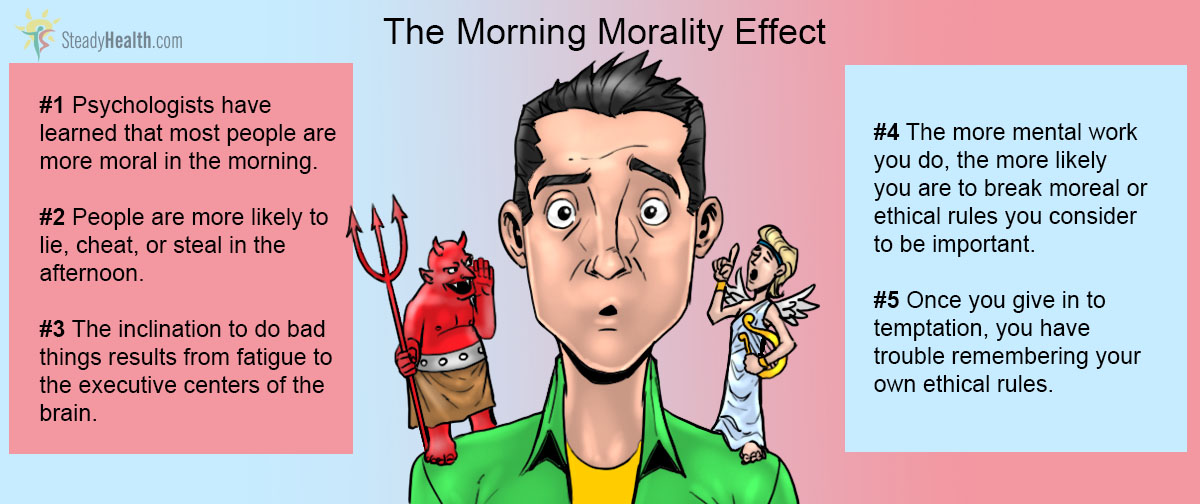Table of Contents
Lots of us puzzle over the question of why good people do bad things. Maybe we really ought to be concerned with when. Research published in the journal Psychological Science in early 2014 found that people are more likely to lie, cheat, and steal, the longer they have been awake.
Four Experiments About Morality And Time of Day
Psychologists Maryam Kouchaki of the Edmond J. Safra Center for Ethics at Harvard University and Isaac H. Smith of the Department of Management at the University of Utah devised four experiments to probe the relationship between time of day and moral behavior.
In the first experiment, the undergraduate student volunteers looked at images of dots on a computer screen and reported whether the dots were more concentrated on the left side of the screen or on the right. If the participants in the study answered that the dots were more concentrated on the right side of the screen, they were rewarded with five cents, with an opportunity to accumulate up to $5.00. Answering that the dots were more concentrated on the right side even when they were actually more concentrated on the left was also rewarded with a nickel. Essentially, the researchers were paying for lies.
Does The Devil Sleep In 'Til Noon?
Some commentators note that the results of these experiments suggest (metaphorically, of course) that an angel sits on your shoulder in the morning and a demon sits on your shoulder in the afternoon. Kouchaki and Smith, however, have a more nuanced explanation of their results.
The two researchers believe that moral behavior requires a brain activity known as executive function. When that part of the brain is fatigued, it is less able to regulate moral behaviors, and actions that are inconsistent with personal standards of morality or ethical behavior are more likely.
What kinds of behaviors "make your brain tired" so that you are more likely to tell a white lie, or break a traffic rule, or take advantage of someone. Smith and Kouchaki say that something as simple as memorizing a list of numbers taxes the executive centers of the brain and increases the risk of "bad" behaviors. Choosing the clothes you want to wear, pouring over a long menu to order lunch, or taking a semester exam in nuclear physics could all strain the brain's ability to regulate moral behavior.
See Also: Two Great Habits That Sharpen Your Focus And Improve Memory
Even night owls, people who prefer to sleep during the day and do most of their activities at night, experience a similar effect. The longer they have been awake, no matter when they woke up, the research in general suggests, the more likely they are to break their moral codes.
- Kouchaki M, Smith IH. The morning morality effect: the influence of time of day on unethical behavior. Psychol Sci. 2014 Jan. 25(1):95-102. doi: 10.1177/0956797613498099. Epub 2013 Oct 28. PMID: 24166855.
- Smith IH, Kouchaki M. Does the Morning Morality Effect Hold True Only for Morning People? Psychol Sci. 2014 Oct 6. pii: 0956797614552499. [Epub ahead of print] No abstract available. PMID: 2528766.
- Mind map by SteadyHealth.com
- Photo courtesy of Frankieleon



Your thoughts on this